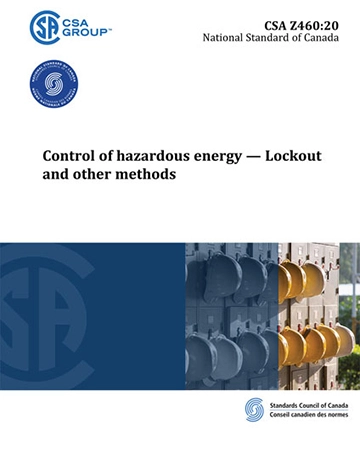Preface
This is the third edition of CSA Z460, Control of hazardous energy — Lockout and other methods. It supersedes the previous editions published in 2013 and 2005.
This Standard provides for flexibility in hazardous energy control methodology decisions as part of an occupational health and safety management system (see CSA Z1000). Other methods are based on risk assessment and application of the classic hazard control hierarchy (see Clause 7.4.4). However, lockout is emphasized as the primary approach to hazardous energy control.
In the creation of this third edition, the following specified changes have been incorporated:
a) clarification of requirement for viewing ports and reference to guidance on nomenclature in Clause 5.2.4;
b) clarification of what is considered to be a remote location and changes to control requirements for remote locations in Clause 7.3.9;
c) substantive changes to Clause 7.4(other control methods) for purposes of clarity;
d) expansion of Annex C updating examples on application of risk assessment;
e) addition of guidance on nomenclature in Annex E;
f) realigned and expanded Annexes D, E, F, G, and H as follows:
i) D1 — Policy;
ii) D2 — Individual lock-out procedure;
iii) D3 — Individual lock-out flowchart;
iv) D4 — Sample approved energy control procedure;
v) E1 — Nomenclature standards;
vi) E2 — Placard examples;
vii) F1 — Group lockout procedures;
viii) F2 — Group lockout flowchart;
ix) F3 — Standard group lockout station — Picture;
x) F4 — Pictorial representation of a group lockout;
xi) F5 — Security pyramid example;
xii) F6 — Group lockout with use of satellite lockbox;
xiii) F7 — Flowchart for group lockout with use of satellite lockbox;
xiv) F8 — Complex group lockout; and
xv) F9 — Lock removal procedures;
g) addition of Annex I — application to construction sites;
h) expansion of Annex M on mobile equipment;
i) addition of Annex S — example of decision-making process for other control methods; and
j) addition of Annex T — consideration of human performance factors.
By permission of International Organization for Standardization (ISO) TC 199, Annexes A and B are based in part on ISO 12100:2010, Safety machinery — General principles for design — Risk assessment and risk reduction.
CSA Group acknowledges that the development of this Standard was made possible, in part, by the financial support of the Canadian Association of Administrators of Labour Law — Occupational Safety and Health (CAALL-OSH), including Provincial and Territorial Governments, as well as the Government of Canada. CSA Group is solely responsible for the content of this Standard, and CSA Group and the funding bodies disclaim any liability in connection with the use of the information contained herein.
This Standard has been developed in compliance with Standards Council of Canada requirements for National Standards of Canada. It has been published as a National Standard of Canada by CSA Group.
Scope
1.1 Scope
This Standard specifies requirements for controlling hazardous energy associated with potentially harmful machines, equipment, and processes (including mobile machinery and equipment; see Annex M). Where a CSA Standard or other recognized Standard exists for a specific type of machinery, equipment, or process, it should be used with this Standard to provide the most effective protection.
1.2 Purpose
The purpose of this Standard is to specify requirements and performance objectives for procedures, techniques, designs, and methods to protect personnel from injury from the inadvertent release of hazardous energy. Release of hazardous energy can include any motion, energization, start-up, or release of stored energy that, from the perspective of the person (s) at risk, is either unintended or deliberate.
Lockout is recognized as the primary method of hazardous energy control. When the tasks specified in Clause 1.3are integral to the production process (see Clause 7.4.2), or full lockout prohibits completion of those tasks, other methods of control that provide effective personal protection are used. These other methods are based on risk assessment (see Clause 7.4.3).
1.3 Application
This Standard applies to, but is not limited to, activities such as erecting, installing, constructing, repairing, adjusting, inspecting, unjamming, setting up, troubleshooting, testing, cleaning, dismantling, servicing, and maintaining machines, equipment, or processes.
Safeguarding of machines and the control of energy supply systems during normal production activities are addressed in CSA Z432, Z434, Z462, and Z767, and other machine- and system-specific standards.
Special considerations for work in confined spaces and under extreme conditions are addressed in CSA Z1006 and Z1010.
1.4 Exclusions
This Standard does not specify safety procedures for manually-operated machines or equipment where the only source of energy is the individual operator.
1.5 Terminology
In this Standard, shall is used to express a requirement, i.e., a provision that the user is obliged to satisfy in order to comply with the Standard; should is used to express a recommendation or that which is advised but not required; may is used to express an option or that which is permissible within the limits of the Standard.
Notes accompanying clauses do not include requirements or alternative requirements; the purpose of a note accompanying a clause is to separate from the text explanatory or informative material.
Notes to tables and figures are considered part of the table or figure and may be written as requirements.
Annexes are designated normative (mandatory) or informative (non-mandatory) to define their application.


